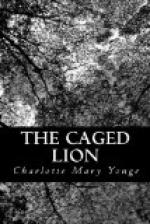The greater part of the army were here encamped, together with the chief nobles, March, Somerset, Salisbury, Warwick, and likewise the King of Scots. James had for a time had the command of the army which besieged and took Dreux while Henry was elsewhere engaged, but in general he acted as a sort of volunteer aide-de-camp to his brother king, and Malcolm Stewart of Glenuskie was always with him as his squire. A great change had come over Malcolm in these last few months. His feeble, sickly boyhood seemed to have been entirely cast off, and the warm genial summer sun of France to have strengthened his frame and developed his powers. He had shot up suddenly to a fair height, had almost lost his lameness, and gained much more appearance of health and power of enduring fatigue. His nerves had become less painfully sensitive, and when after his first skirmish, during which he had kept close to King James, far too much terrified to stir an inch from him, he had not only found himself perfectly safe, but had been much praised for his valour, he had been so much pleased with himself that he quite wished for another occasion of displaying his bravery; and, what with use, and what with the increasing spirit of pugnacity, he was as sincere as Ralf Percy in abusing the French for never coming to a pitched battle. Perhaps, indeed, Malcolm spoke even more eagerly than Ralf, in his own surprise and gratification at finding himself no coward, and his fear lest Percy should detect that he ever had been supposed to be such.
So far the King of Scots had succeeded in awakening martial fire in the boy, but he found him less the companion in other matters than he had intended. When at Paris, James would have taken him to explore the learned hoards of the already venerable University of Paris, where young James Kennedy—son to Sir James Kennedy of Dunure, and to Mary, an elder sister of the King—was studying with exceeding zeal. Both James and Dr. Bennet were greatly interested in this famous abode of hearing—the King, indeed, was already sketching out designs in his own mind for a similar institution in Scotland, designs that were destined to be carried out after his death by Kennedy; and Malcolm perforce heard many inquiries and replies, but he held aloof from friendship with his clerkly cousin Kennedy, and closed his ears as much as might be, hanging back as if afraid of returning to his books. There was in this some real dread of Ralf Percy’s mockery of his clerkliness, but there was more real distaste for all that appertained to the past days that he now despised.
The tide of vitality and physical vigour, so long deficient, had, whom it had fairly set in, carried him away with it: and in the activity of body newly acquired, mental activity had well-nigh ceased. And therewith went much of the tenderness of conscience and devout habits of old. They dropped from him, sometimes for lack of time, sometimes from false shame, and by and by from very weariness and distaste. He was soldier now, and not monk—ay, and even the observances that such soldiers as Henry and James never failed in, and always enforced, were becoming a burthen to him. They wakened misgivings that he did not like, and that must wait till his next general shrift.




